University Nursing Essay: Evidence-Based Practice and Patient Care
VerifiedAdded on 2022/10/03
|17
|3151
|264
Essay
AI Summary
This essay presents a person-centered assessment of a 67-year-old widow with osteoarthritis and depression, highlighting her needs and challenges. The assessment involved an interview to gather information about her experiences and needs related to aging. The essay incorporates a critical literature review, exploring evidence-based interventions such as self-management educational programs, pain intervention techniques, and non-pharmacological therapies, including yoga therapy and dietary support. The discussion section outlines the implementation of care, including residential aged care, nutritional support, yoga therapy, physiotherapy, and spiritual interventions. The essay emphasizes the importance of respecting patient autonomy, involving family members, and utilizing a multidisciplinary team. The conclusion summarizes the challenges of aging, the importance of person-centered assessment, and the need for tailored interventions to improve the quality of life for older adults. References are provided to support the evidence and recommendations made throughout the essay.
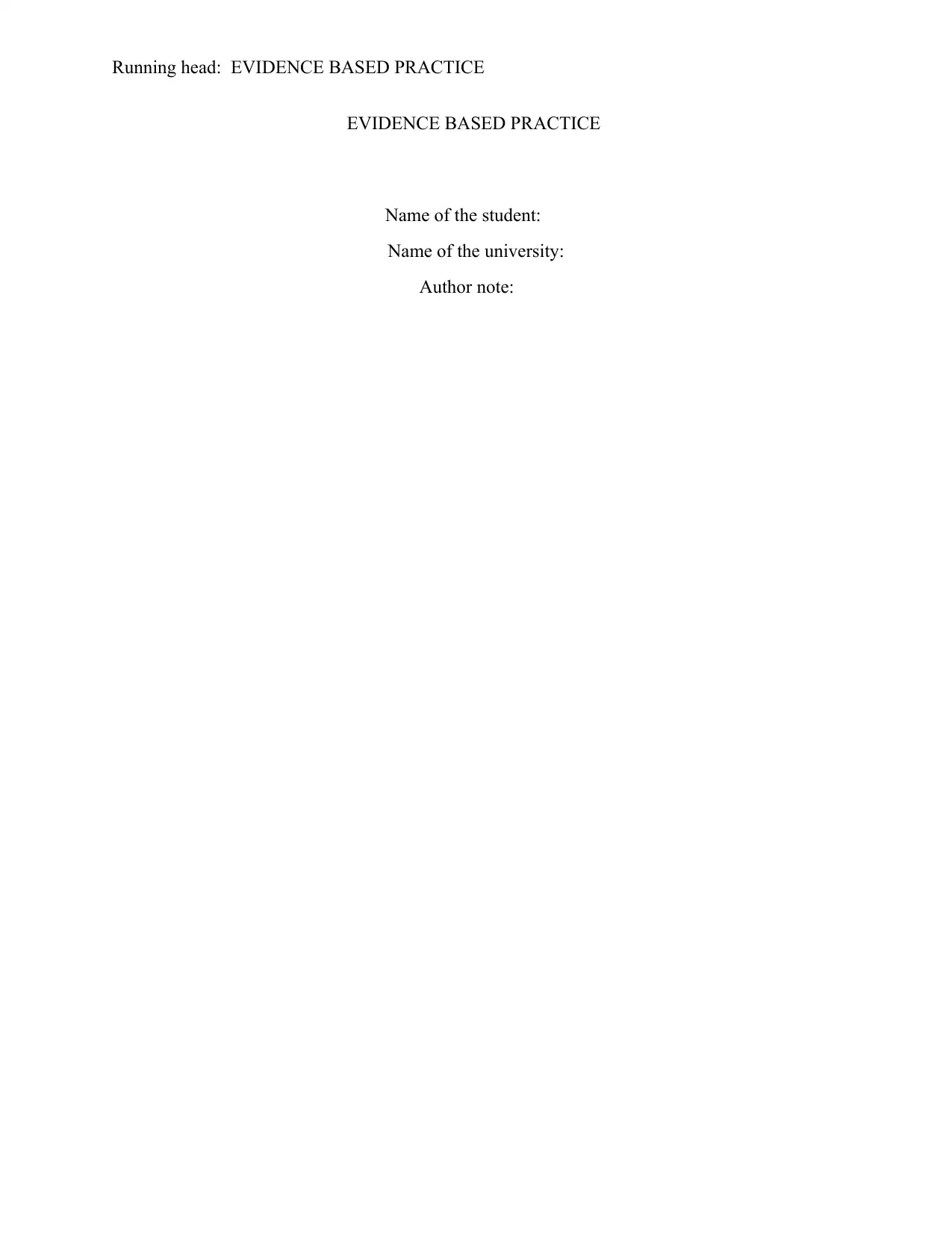
Running head: EVIDENCE BASED PRACTICE
EVIDENCE BASED PRACTICE
Name of the student:
Name of the university:
Author note:
EVIDENCE BASED PRACTICE
Name of the student:
Name of the university:
Author note:
Paraphrase This Document
Need a fresh take? Get an instant paraphrase of this document with our AI Paraphraser
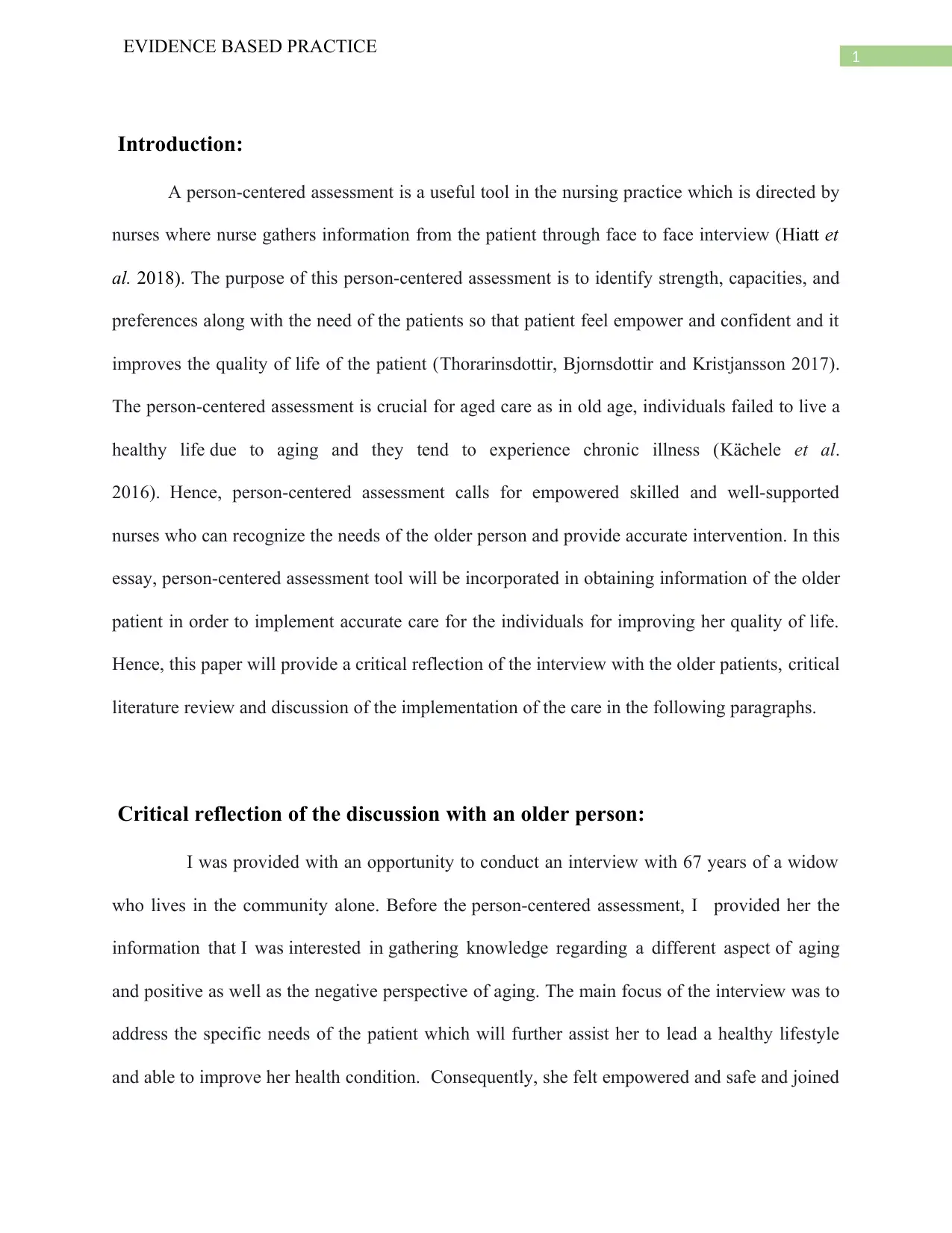
1
EVIDENCE BASED PRACTICE
Introduction:
A person-centered assessment is a useful tool in the nursing practice which is directed by
nurses where nurse gathers information from the patient through face to face interview (Hiatt et
al. 2018). The purpose of this person-centered assessment is to identify strength, capacities, and
preferences along with the need of the patients so that patient feel empower and confident and it
improves the quality of life of the patient (Thorarinsdottir, Bjornsdottir and Kristjansson 2017).
The person-centered assessment is crucial for aged care as in old age, individuals failed to live a
healthy life due to aging and they tend to experience chronic illness (Kächele et al.
2016). Hence, person-centered assessment calls for empowered skilled and well-supported
nurses who can recognize the needs of the older person and provide accurate intervention. In this
essay, person-centered assessment tool will be incorporated in obtaining information of the older
patient in order to implement accurate care for the individuals for improving her quality of life.
Hence, this paper will provide a critical reflection of the interview with the older patients, critical
literature review and discussion of the implementation of the care in the following paragraphs.
Critical reflection of the discussion with an older person:
I was provided with an opportunity to conduct an interview with 67 years of a widow
who lives in the community alone. Before the person-centered assessment, I provided her the
information that I was interested in gathering knowledge regarding a different aspect of aging
and positive as well as the negative perspective of aging. The main focus of the interview was to
address the specific needs of the patient which will further assist her to lead a healthy lifestyle
and able to improve her health condition. Consequently, she felt empowered and safe and joined
EVIDENCE BASED PRACTICE
Introduction:
A person-centered assessment is a useful tool in the nursing practice which is directed by
nurses where nurse gathers information from the patient through face to face interview (Hiatt et
al. 2018). The purpose of this person-centered assessment is to identify strength, capacities, and
preferences along with the need of the patients so that patient feel empower and confident and it
improves the quality of life of the patient (Thorarinsdottir, Bjornsdottir and Kristjansson 2017).
The person-centered assessment is crucial for aged care as in old age, individuals failed to live a
healthy life due to aging and they tend to experience chronic illness (Kächele et al.
2016). Hence, person-centered assessment calls for empowered skilled and well-supported
nurses who can recognize the needs of the older person and provide accurate intervention. In this
essay, person-centered assessment tool will be incorporated in obtaining information of the older
patient in order to implement accurate care for the individuals for improving her quality of life.
Hence, this paper will provide a critical reflection of the interview with the older patients, critical
literature review and discussion of the implementation of the care in the following paragraphs.
Critical reflection of the discussion with an older person:
I was provided with an opportunity to conduct an interview with 67 years of a widow
who lives in the community alone. Before the person-centered assessment, I provided her the
information that I was interested in gathering knowledge regarding a different aspect of aging
and positive as well as the negative perspective of aging. The main focus of the interview was to
address the specific needs of the patient which will further assist her to lead a healthy lifestyle
and able to improve her health condition. Consequently, she felt empowered and safe and joined
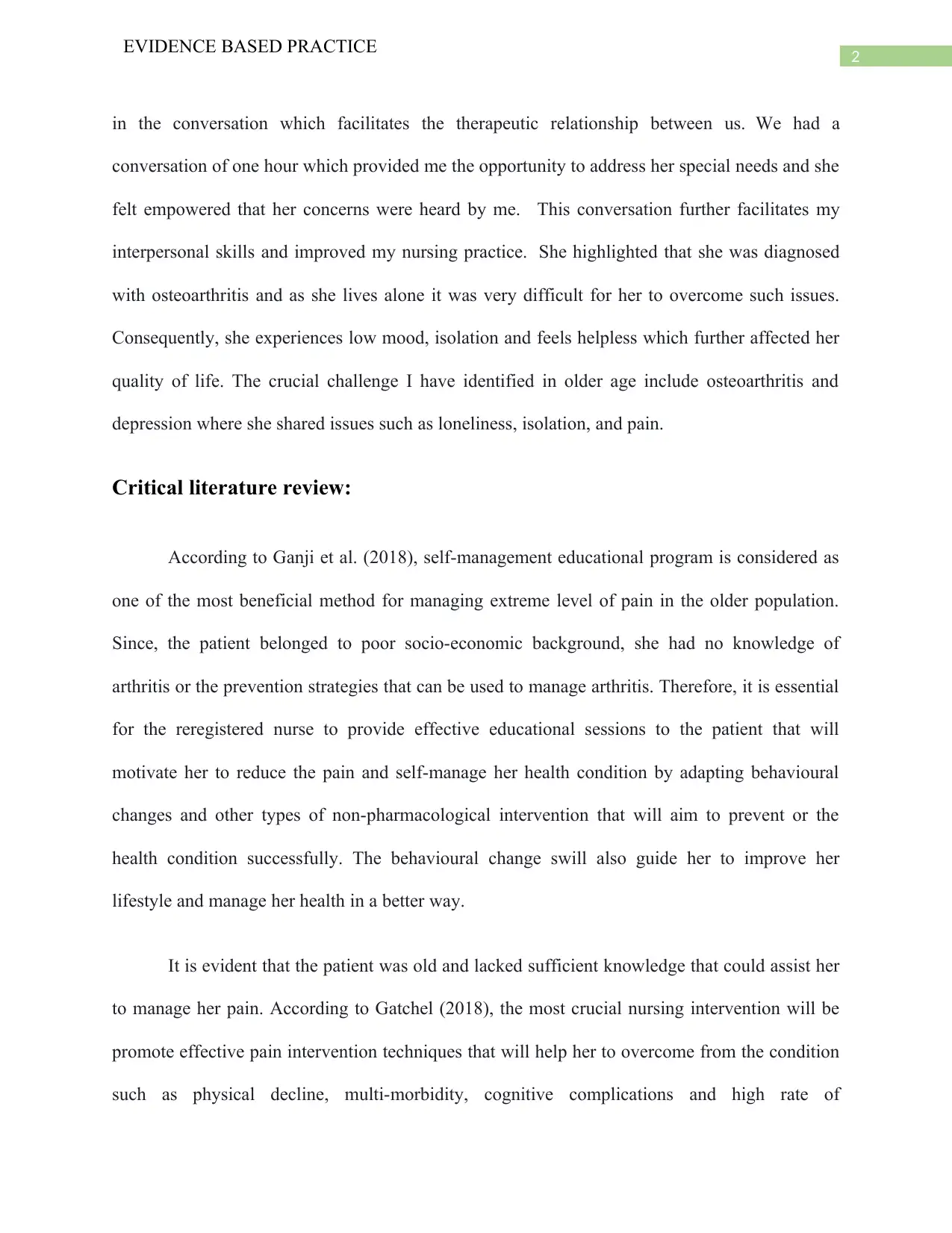
2
EVIDENCE BASED PRACTICE
in the conversation which facilitates the therapeutic relationship between us. We had a
conversation of one hour which provided me the opportunity to address her special needs and she
felt empowered that her concerns were heard by me. This conversation further facilitates my
interpersonal skills and improved my nursing practice. She highlighted that she was diagnosed
with osteoarthritis and as she lives alone it was very difficult for her to overcome such issues.
Consequently, she experiences low mood, isolation and feels helpless which further affected her
quality of life. The crucial challenge I have identified in older age include osteoarthritis and
depression where she shared issues such as loneliness, isolation, and pain.
Critical literature review:
According to Ganji et al. (2018), self-management educational program is considered as
one of the most beneficial method for managing extreme level of pain in the older population.
Since, the patient belonged to poor socio-economic background, she had no knowledge of
arthritis or the prevention strategies that can be used to manage arthritis. Therefore, it is essential
for the reregistered nurse to provide effective educational sessions to the patient that will
motivate her to reduce the pain and self-manage her health condition by adapting behavioural
changes and other types of non-pharmacological intervention that will aim to prevent or the
health condition successfully. The behavioural change swill also guide her to improve her
lifestyle and manage her health in a better way.
It is evident that the patient was old and lacked sufficient knowledge that could assist her
to manage her pain. According to Gatchel (2018), the most crucial nursing intervention will be
promote effective pain intervention techniques that will help her to overcome from the condition
such as physical decline, multi-morbidity, cognitive complications and high rate of
EVIDENCE BASED PRACTICE
in the conversation which facilitates the therapeutic relationship between us. We had a
conversation of one hour which provided me the opportunity to address her special needs and she
felt empowered that her concerns were heard by me. This conversation further facilitates my
interpersonal skills and improved my nursing practice. She highlighted that she was diagnosed
with osteoarthritis and as she lives alone it was very difficult for her to overcome such issues.
Consequently, she experiences low mood, isolation and feels helpless which further affected her
quality of life. The crucial challenge I have identified in older age include osteoarthritis and
depression where she shared issues such as loneliness, isolation, and pain.
Critical literature review:
According to Ganji et al. (2018), self-management educational program is considered as
one of the most beneficial method for managing extreme level of pain in the older population.
Since, the patient belonged to poor socio-economic background, she had no knowledge of
arthritis or the prevention strategies that can be used to manage arthritis. Therefore, it is essential
for the reregistered nurse to provide effective educational sessions to the patient that will
motivate her to reduce the pain and self-manage her health condition by adapting behavioural
changes and other types of non-pharmacological intervention that will aim to prevent or the
health condition successfully. The behavioural change swill also guide her to improve her
lifestyle and manage her health in a better way.
It is evident that the patient was old and lacked sufficient knowledge that could assist her
to manage her pain. According to Gatchel (2018), the most crucial nursing intervention will be
promote effective pain intervention techniques that will help her to overcome from the condition
such as physical decline, multi-morbidity, cognitive complications and high rate of
⊘ This is a preview!⊘
Do you want full access?
Subscribe today to unlock all pages.

Trusted by 1+ million students worldwide
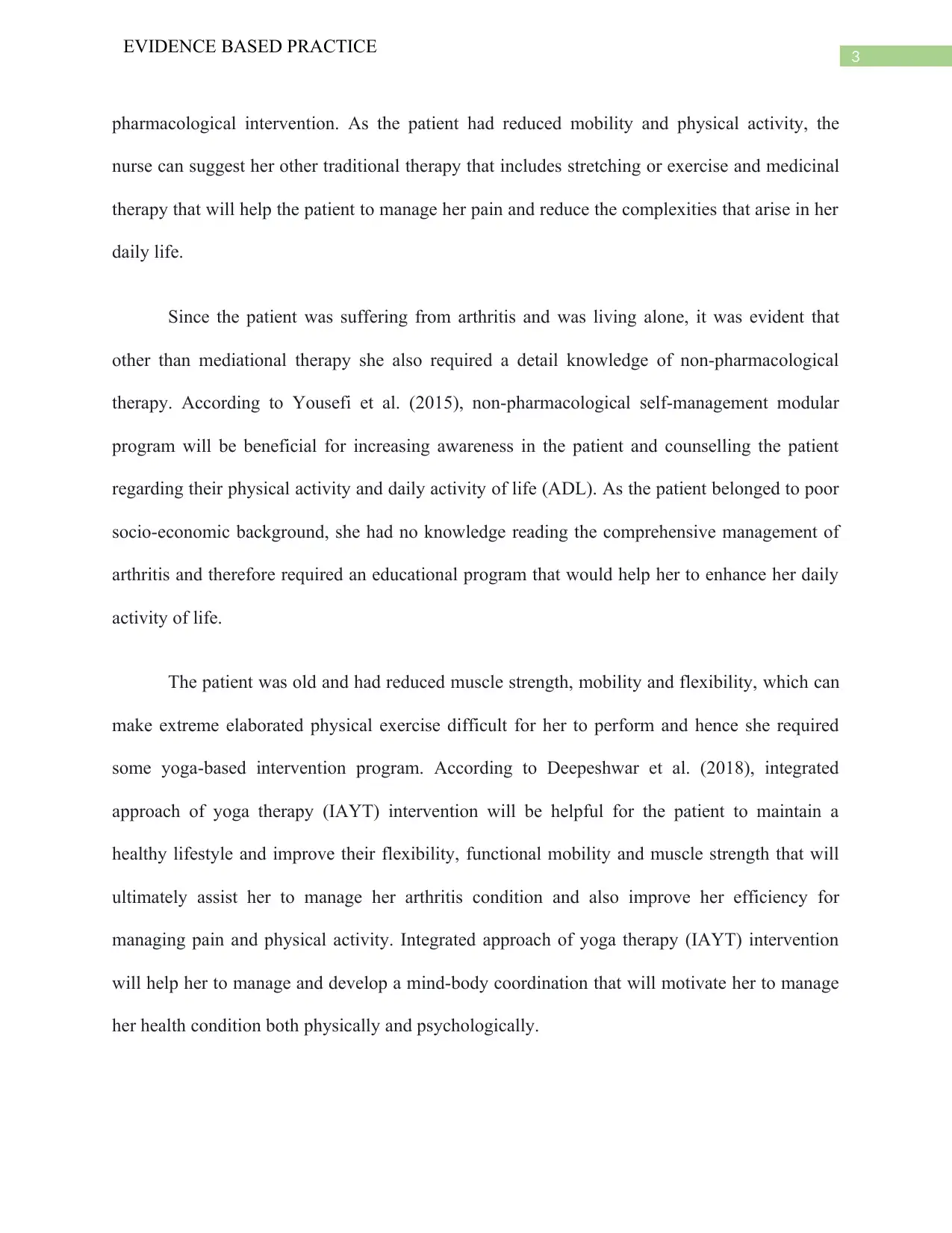
3
EVIDENCE BASED PRACTICE
pharmacological intervention. As the patient had reduced mobility and physical activity, the
nurse can suggest her other traditional therapy that includes stretching or exercise and medicinal
therapy that will help the patient to manage her pain and reduce the complexities that arise in her
daily life.
Since the patient was suffering from arthritis and was living alone, it was evident that
other than mediational therapy she also required a detail knowledge of non-pharmacological
therapy. According to Yousefi et al. (2015), non-pharmacological self-management modular
program will be beneficial for increasing awareness in the patient and counselling the patient
regarding their physical activity and daily activity of life (ADL). As the patient belonged to poor
socio-economic background, she had no knowledge reading the comprehensive management of
arthritis and therefore required an educational program that would help her to enhance her daily
activity of life.
The patient was old and had reduced muscle strength, mobility and flexibility, which can
make extreme elaborated physical exercise difficult for her to perform and hence she required
some yoga-based intervention program. According to Deepeshwar et al. (2018), integrated
approach of yoga therapy (IAYT) intervention will be helpful for the patient to maintain a
healthy lifestyle and improve their flexibility, functional mobility and muscle strength that will
ultimately assist her to manage her arthritis condition and also improve her efficiency for
managing pain and physical activity. Integrated approach of yoga therapy (IAYT) intervention
will help her to manage and develop a mind-body coordination that will motivate her to manage
her health condition both physically and psychologically.
EVIDENCE BASED PRACTICE
pharmacological intervention. As the patient had reduced mobility and physical activity, the
nurse can suggest her other traditional therapy that includes stretching or exercise and medicinal
therapy that will help the patient to manage her pain and reduce the complexities that arise in her
daily life.
Since the patient was suffering from arthritis and was living alone, it was evident that
other than mediational therapy she also required a detail knowledge of non-pharmacological
therapy. According to Yousefi et al. (2015), non-pharmacological self-management modular
program will be beneficial for increasing awareness in the patient and counselling the patient
regarding their physical activity and daily activity of life (ADL). As the patient belonged to poor
socio-economic background, she had no knowledge reading the comprehensive management of
arthritis and therefore required an educational program that would help her to enhance her daily
activity of life.
The patient was old and had reduced muscle strength, mobility and flexibility, which can
make extreme elaborated physical exercise difficult for her to perform and hence she required
some yoga-based intervention program. According to Deepeshwar et al. (2018), integrated
approach of yoga therapy (IAYT) intervention will be helpful for the patient to maintain a
healthy lifestyle and improve their flexibility, functional mobility and muscle strength that will
ultimately assist her to manage her arthritis condition and also improve her efficiency for
managing pain and physical activity. Integrated approach of yoga therapy (IAYT) intervention
will help her to manage and develop a mind-body coordination that will motivate her to manage
her health condition both physically and psychologically.
Paraphrase This Document
Need a fresh take? Get an instant paraphrase of this document with our AI Paraphraser
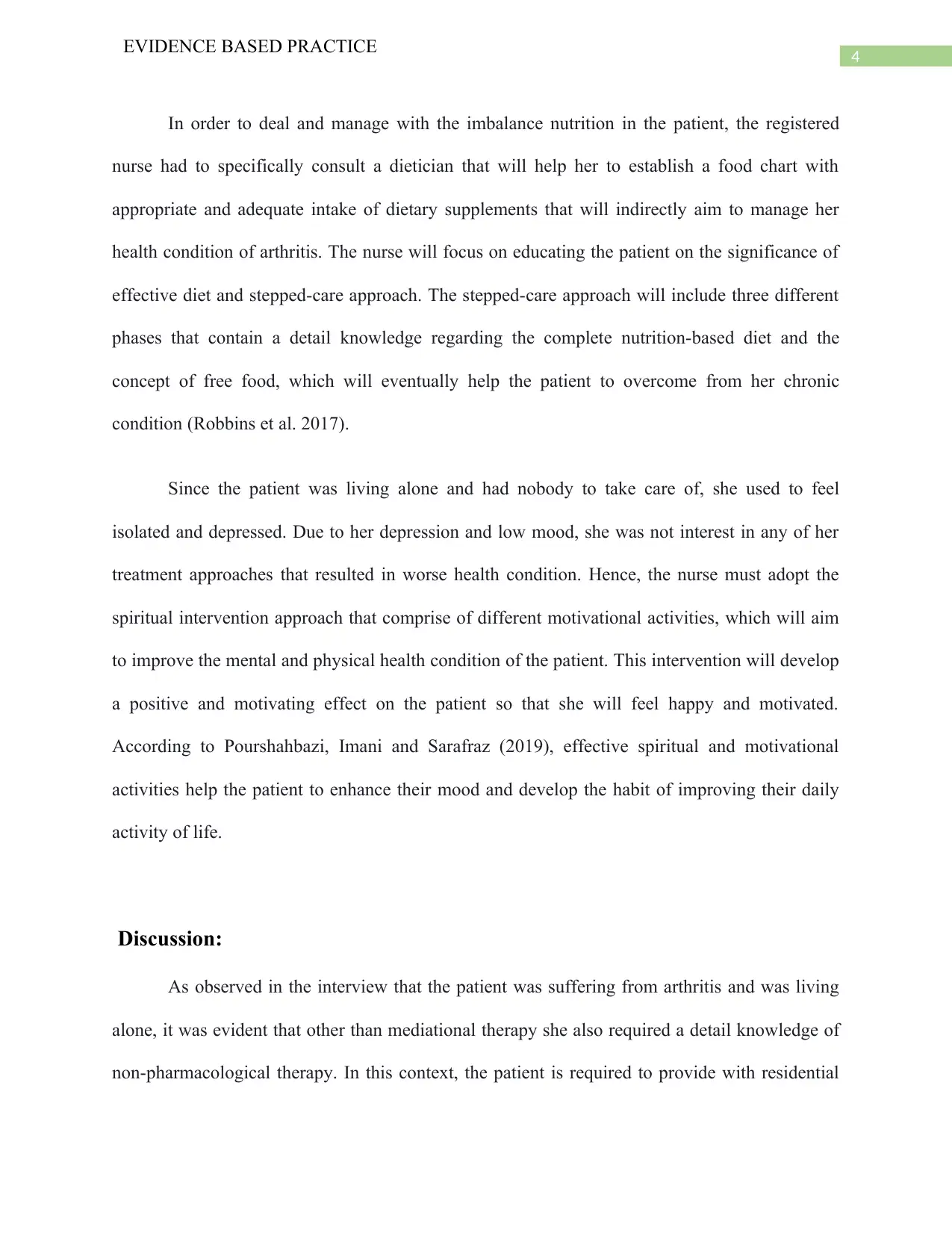
4
EVIDENCE BASED PRACTICE
In order to deal and manage with the imbalance nutrition in the patient, the registered
nurse had to specifically consult a dietician that will help her to establish a food chart with
appropriate and adequate intake of dietary supplements that will indirectly aim to manage her
health condition of arthritis. The nurse will focus on educating the patient on the significance of
effective diet and stepped-care approach. The stepped-care approach will include three different
phases that contain a detail knowledge regarding the complete nutrition-based diet and the
concept of free food, which will eventually help the patient to overcome from her chronic
condition (Robbins et al. 2017).
Since the patient was living alone and had nobody to take care of, she used to feel
isolated and depressed. Due to her depression and low mood, she was not interest in any of her
treatment approaches that resulted in worse health condition. Hence, the nurse must adopt the
spiritual intervention approach that comprise of different motivational activities, which will aim
to improve the mental and physical health condition of the patient. This intervention will develop
a positive and motivating effect on the patient so that she will feel happy and motivated.
According to Pourshahbazi, Imani and Sarafraz (2019), effective spiritual and motivational
activities help the patient to enhance their mood and develop the habit of improving their daily
activity of life.
Discussion:
As observed in the interview that the patient was suffering from arthritis and was living
alone, it was evident that other than mediational therapy she also required a detail knowledge of
non-pharmacological therapy. In this context, the patient is required to provide with residential
EVIDENCE BASED PRACTICE
In order to deal and manage with the imbalance nutrition in the patient, the registered
nurse had to specifically consult a dietician that will help her to establish a food chart with
appropriate and adequate intake of dietary supplements that will indirectly aim to manage her
health condition of arthritis. The nurse will focus on educating the patient on the significance of
effective diet and stepped-care approach. The stepped-care approach will include three different
phases that contain a detail knowledge regarding the complete nutrition-based diet and the
concept of free food, which will eventually help the patient to overcome from her chronic
condition (Robbins et al. 2017).
Since the patient was living alone and had nobody to take care of, she used to feel
isolated and depressed. Due to her depression and low mood, she was not interest in any of her
treatment approaches that resulted in worse health condition. Hence, the nurse must adopt the
spiritual intervention approach that comprise of different motivational activities, which will aim
to improve the mental and physical health condition of the patient. This intervention will develop
a positive and motivating effect on the patient so that she will feel happy and motivated.
According to Pourshahbazi, Imani and Sarafraz (2019), effective spiritual and motivational
activities help the patient to enhance their mood and develop the habit of improving their daily
activity of life.
Discussion:
As observed in the interview that the patient was suffering from arthritis and was living
alone, it was evident that other than mediational therapy she also required a detail knowledge of
non-pharmacological therapy. In this context, the patient is required to provide with residential
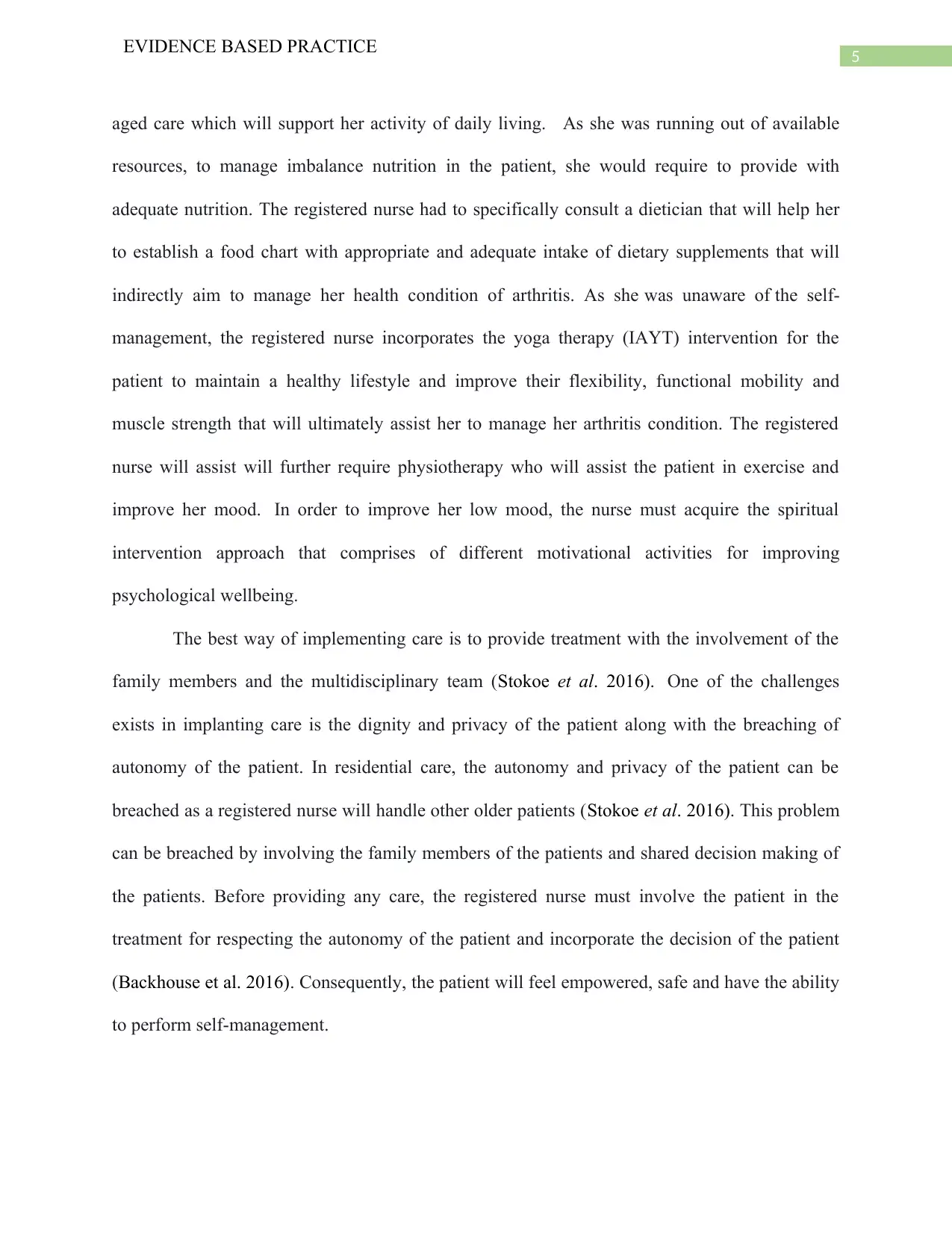
5
EVIDENCE BASED PRACTICE
aged care which will support her activity of daily living. As she was running out of available
resources, to manage imbalance nutrition in the patient, she would require to provide with
adequate nutrition. The registered nurse had to specifically consult a dietician that will help her
to establish a food chart with appropriate and adequate intake of dietary supplements that will
indirectly aim to manage her health condition of arthritis. As she was unaware of the self-
management, the registered nurse incorporates the yoga therapy (IAYT) intervention for the
patient to maintain a healthy lifestyle and improve their flexibility, functional mobility and
muscle strength that will ultimately assist her to manage her arthritis condition. The registered
nurse will assist will further require physiotherapy who will assist the patient in exercise and
improve her mood. In order to improve her low mood, the nurse must acquire the spiritual
intervention approach that comprises of different motivational activities for improving
psychological wellbeing.
The best way of implementing care is to provide treatment with the involvement of the
family members and the multidisciplinary team (Stokoe et al. 2016). One of the challenges
exists in implanting care is the dignity and privacy of the patient along with the breaching of
autonomy of the patient. In residential care, the autonomy and privacy of the patient can be
breached as a registered nurse will handle other older patients (Stokoe et al. 2016). This problem
can be breached by involving the family members of the patients and shared decision making of
the patients. Before providing any care, the registered nurse must involve the patient in the
treatment for respecting the autonomy of the patient and incorporate the decision of the patient
(Backhouse et al. 2016). Consequently, the patient will feel empowered, safe and have the ability
to perform self-management.
EVIDENCE BASED PRACTICE
aged care which will support her activity of daily living. As she was running out of available
resources, to manage imbalance nutrition in the patient, she would require to provide with
adequate nutrition. The registered nurse had to specifically consult a dietician that will help her
to establish a food chart with appropriate and adequate intake of dietary supplements that will
indirectly aim to manage her health condition of arthritis. As she was unaware of the self-
management, the registered nurse incorporates the yoga therapy (IAYT) intervention for the
patient to maintain a healthy lifestyle and improve their flexibility, functional mobility and
muscle strength that will ultimately assist her to manage her arthritis condition. The registered
nurse will assist will further require physiotherapy who will assist the patient in exercise and
improve her mood. In order to improve her low mood, the nurse must acquire the spiritual
intervention approach that comprises of different motivational activities for improving
psychological wellbeing.
The best way of implementing care is to provide treatment with the involvement of the
family members and the multidisciplinary team (Stokoe et al. 2016). One of the challenges
exists in implanting care is the dignity and privacy of the patient along with the breaching of
autonomy of the patient. In residential care, the autonomy and privacy of the patient can be
breached as a registered nurse will handle other older patients (Stokoe et al. 2016). This problem
can be breached by involving the family members of the patients and shared decision making of
the patients. Before providing any care, the registered nurse must involve the patient in the
treatment for respecting the autonomy of the patient and incorporate the decision of the patient
(Backhouse et al. 2016). Consequently, the patient will feel empowered, safe and have the ability
to perform self-management.
⊘ This is a preview!⊘
Do you want full access?
Subscribe today to unlock all pages.

Trusted by 1+ million students worldwide
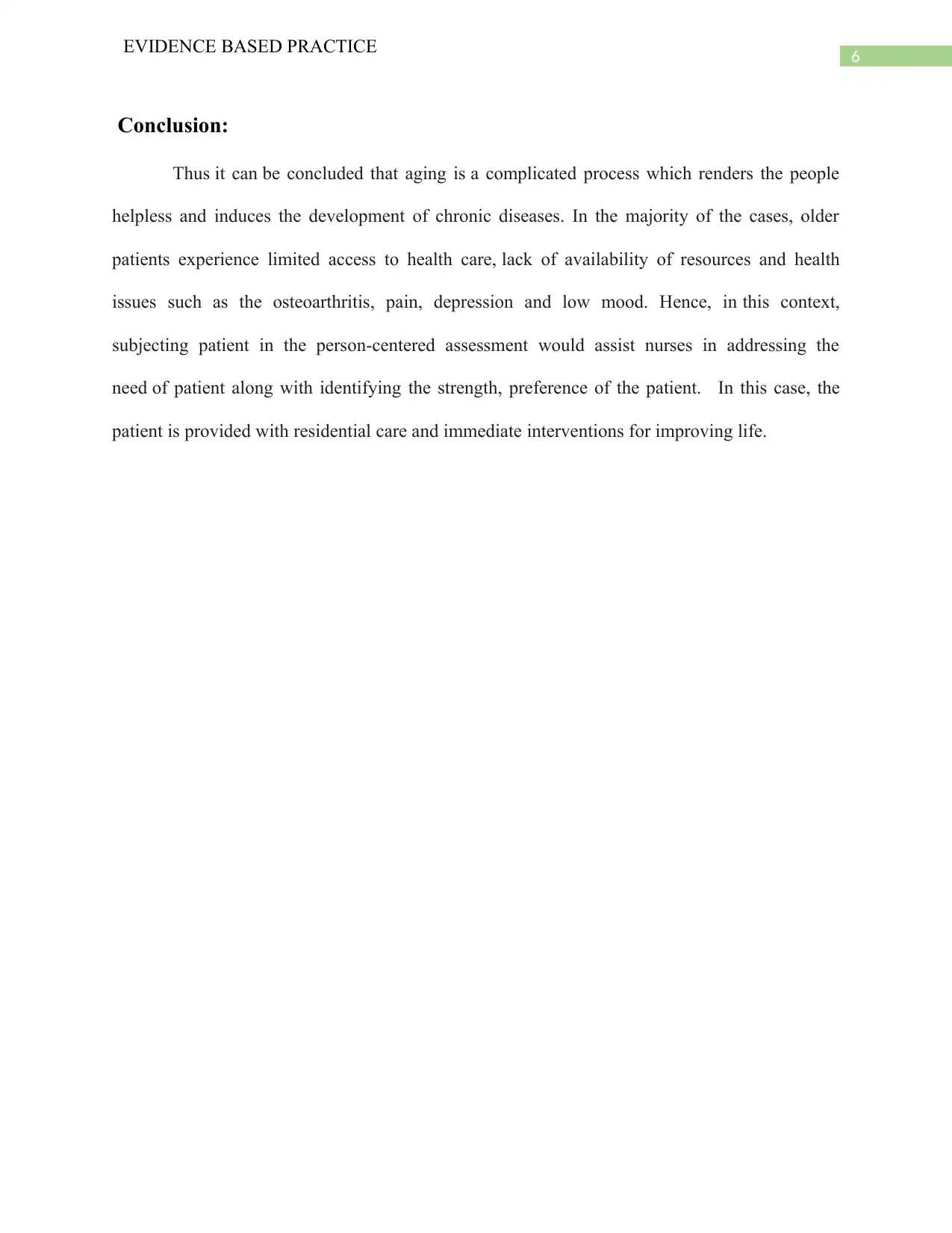
6
EVIDENCE BASED PRACTICE
Conclusion:
Thus it can be concluded that aging is a complicated process which renders the people
helpless and induces the development of chronic diseases. In the majority of the cases, older
patients experience limited access to health care, lack of availability of resources and health
issues such as the osteoarthritis, pain, depression and low mood. Hence, in this context,
subjecting patient in the person-centered assessment would assist nurses in addressing the
need of patient along with identifying the strength, preference of the patient. In this case, the
patient is provided with residential care and immediate interventions for improving life.
EVIDENCE BASED PRACTICE
Conclusion:
Thus it can be concluded that aging is a complicated process which renders the people
helpless and induces the development of chronic diseases. In the majority of the cases, older
patients experience limited access to health care, lack of availability of resources and health
issues such as the osteoarthritis, pain, depression and low mood. Hence, in this context,
subjecting patient in the person-centered assessment would assist nurses in addressing the
need of patient along with identifying the strength, preference of the patient. In this case, the
patient is provided with residential care and immediate interventions for improving life.
Paraphrase This Document
Need a fresh take? Get an instant paraphrase of this document with our AI Paraphraser
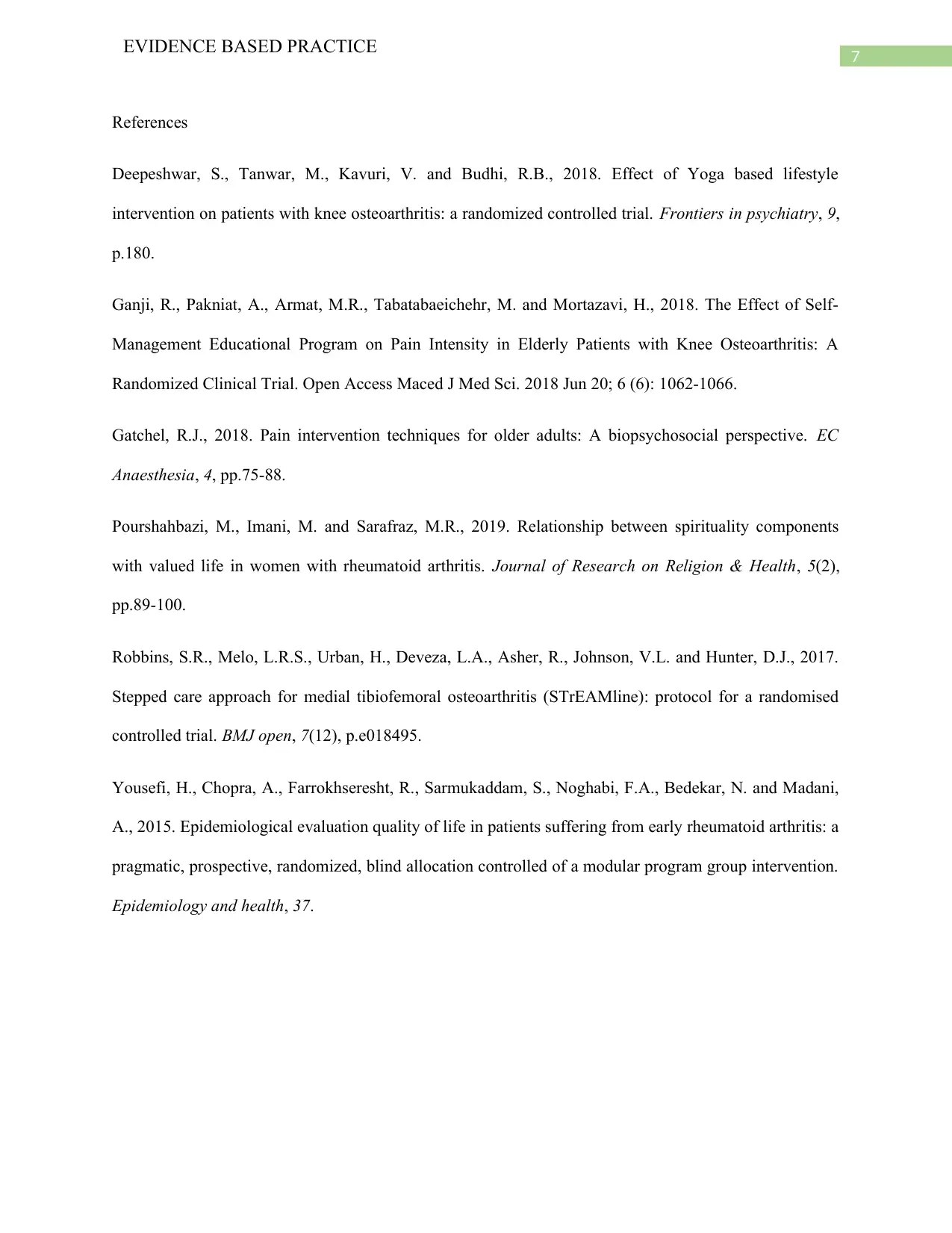
7
EVIDENCE BASED PRACTICE
References
Deepeshwar, S., Tanwar, M., Kavuri, V. and Budhi, R.B., 2018. Effect of Yoga based lifestyle
intervention on patients with knee osteoarthritis: a randomized controlled trial. Frontiers in psychiatry, 9,
p.180.
Ganji, R., Pakniat, A., Armat, M.R., Tabatabaeichehr, M. and Mortazavi, H., 2018. The Effect of Self-
Management Educational Program on Pain Intensity in Elderly Patients with Knee Osteoarthritis: A
Randomized Clinical Trial. Open Access Maced J Med Sci. 2018 Jun 20; 6 (6): 1062-1066.
Gatchel, R.J., 2018. Pain intervention techniques for older adults: A biopsychosocial perspective. EC
Anaesthesia, 4, pp.75-88.
Pourshahbazi, M., Imani, M. and Sarafraz, M.R., 2019. Relationship between spirituality components
with valued life in women with rheumatoid arthritis. Journal of Research on Religion & Health, 5(2),
pp.89-100.
Robbins, S.R., Melo, L.R.S., Urban, H., Deveza, L.A., Asher, R., Johnson, V.L. and Hunter, D.J., 2017.
Stepped care approach for medial tibiofemoral osteoarthritis (STrEAMline): protocol for a randomised
controlled trial. BMJ open, 7(12), p.e018495.
Yousefi, H., Chopra, A., Farrokhseresht, R., Sarmukaddam, S., Noghabi, F.A., Bedekar, N. and Madani,
A., 2015. Epidemiological evaluation quality of life in patients suffering from early rheumatoid arthritis: a
pragmatic, prospective, randomized, blind allocation controlled of a modular program group intervention.
Epidemiology and health, 37.
EVIDENCE BASED PRACTICE
References
Deepeshwar, S., Tanwar, M., Kavuri, V. and Budhi, R.B., 2018. Effect of Yoga based lifestyle
intervention on patients with knee osteoarthritis: a randomized controlled trial. Frontiers in psychiatry, 9,
p.180.
Ganji, R., Pakniat, A., Armat, M.R., Tabatabaeichehr, M. and Mortazavi, H., 2018. The Effect of Self-
Management Educational Program on Pain Intensity in Elderly Patients with Knee Osteoarthritis: A
Randomized Clinical Trial. Open Access Maced J Med Sci. 2018 Jun 20; 6 (6): 1062-1066.
Gatchel, R.J., 2018. Pain intervention techniques for older adults: A biopsychosocial perspective. EC
Anaesthesia, 4, pp.75-88.
Pourshahbazi, M., Imani, M. and Sarafraz, M.R., 2019. Relationship between spirituality components
with valued life in women with rheumatoid arthritis. Journal of Research on Religion & Health, 5(2),
pp.89-100.
Robbins, S.R., Melo, L.R.S., Urban, H., Deveza, L.A., Asher, R., Johnson, V.L. and Hunter, D.J., 2017.
Stepped care approach for medial tibiofemoral osteoarthritis (STrEAMline): protocol for a randomised
controlled trial. BMJ open, 7(12), p.e018495.
Yousefi, H., Chopra, A., Farrokhseresht, R., Sarmukaddam, S., Noghabi, F.A., Bedekar, N. and Madani,
A., 2015. Epidemiological evaluation quality of life in patients suffering from early rheumatoid arthritis: a
pragmatic, prospective, randomized, blind allocation controlled of a modular program group intervention.
Epidemiology and health, 37.
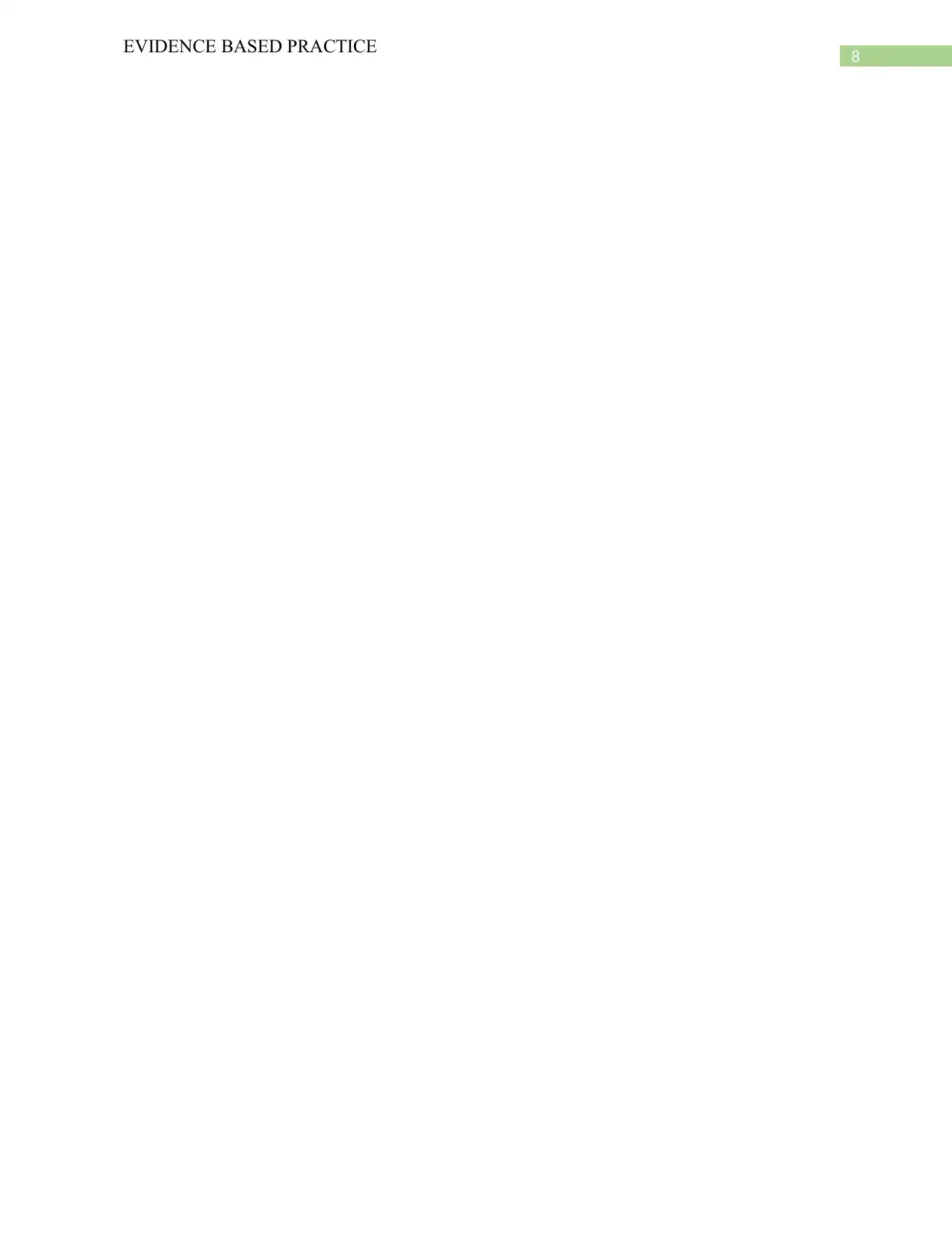
8
EVIDENCE BASED PRACTICE
EVIDENCE BASED PRACTICE
⊘ This is a preview!⊘
Do you want full access?
Subscribe today to unlock all pages.

Trusted by 1+ million students worldwide
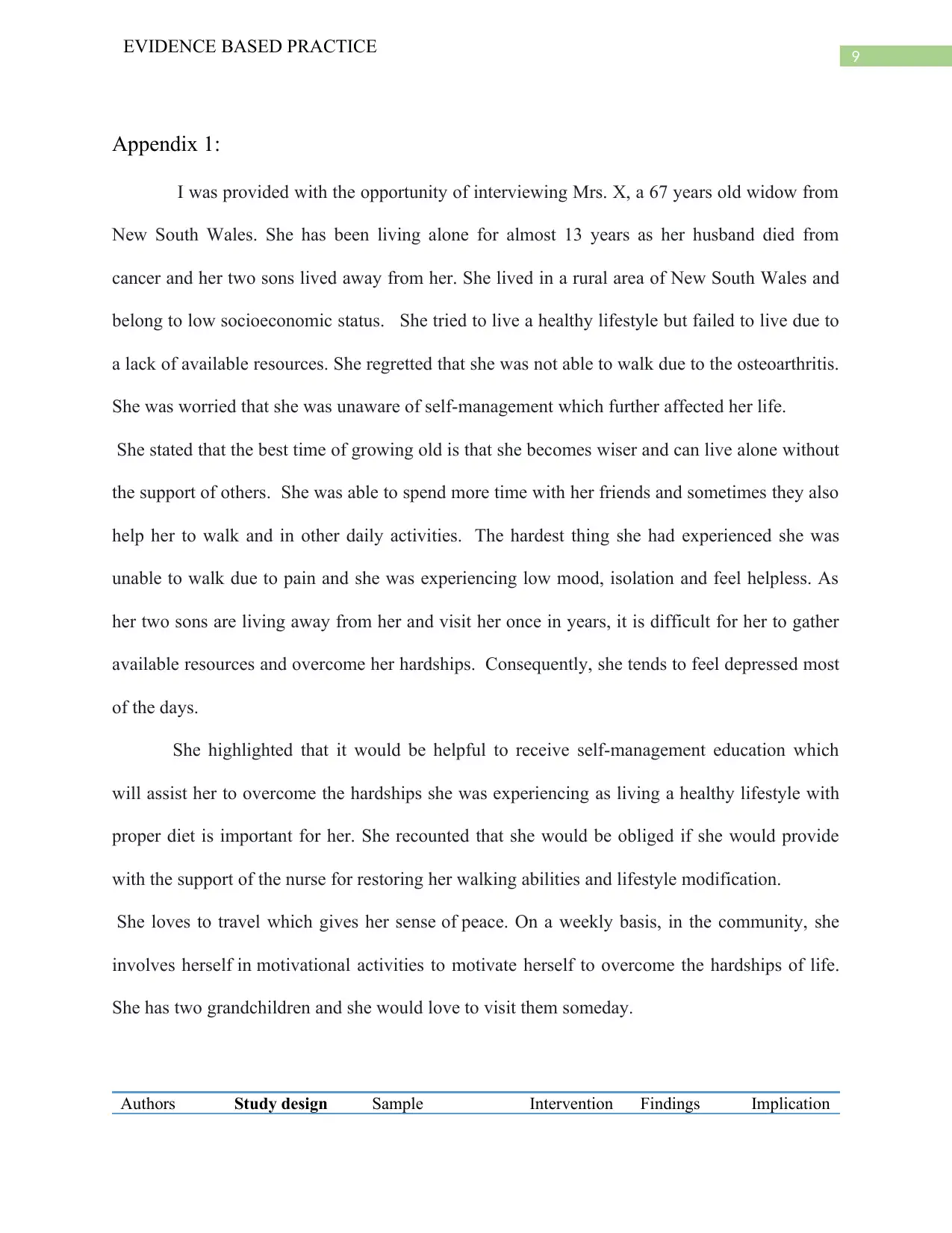
9
EVIDENCE BASED PRACTICE
Appendix 1:
I was provided with the opportunity of interviewing Mrs. X, a 67 years old widow from
New South Wales. She has been living alone for almost 13 years as her husband died from
cancer and her two sons lived away from her. She lived in a rural area of New South Wales and
belong to low socioeconomic status. She tried to live a healthy lifestyle but failed to live due to
a lack of available resources. She regretted that she was not able to walk due to the osteoarthritis.
She was worried that she was unaware of self-management which further affected her life.
She stated that the best time of growing old is that she becomes wiser and can live alone without
the support of others. She was able to spend more time with her friends and sometimes they also
help her to walk and in other daily activities. The hardest thing she had experienced she was
unable to walk due to pain and she was experiencing low mood, isolation and feel helpless. As
her two sons are living away from her and visit her once in years, it is difficult for her to gather
available resources and overcome her hardships. Consequently, she tends to feel depressed most
of the days.
She highlighted that it would be helpful to receive self-management education which
will assist her to overcome the hardships she was experiencing as living a healthy lifestyle with
proper diet is important for her. She recounted that she would be obliged if she would provide
with the support of the nurse for restoring her walking abilities and lifestyle modification.
She loves to travel which gives her sense of peace. On a weekly basis, in the community, she
involves herself in motivational activities to motivate herself to overcome the hardships of life.
She has two grandchildren and she would love to visit them someday.
Authors Study design Sample Intervention Findings Implication
EVIDENCE BASED PRACTICE
Appendix 1:
I was provided with the opportunity of interviewing Mrs. X, a 67 years old widow from
New South Wales. She has been living alone for almost 13 years as her husband died from
cancer and her two sons lived away from her. She lived in a rural area of New South Wales and
belong to low socioeconomic status. She tried to live a healthy lifestyle but failed to live due to
a lack of available resources. She regretted that she was not able to walk due to the osteoarthritis.
She was worried that she was unaware of self-management which further affected her life.
She stated that the best time of growing old is that she becomes wiser and can live alone without
the support of others. She was able to spend more time with her friends and sometimes they also
help her to walk and in other daily activities. The hardest thing she had experienced she was
unable to walk due to pain and she was experiencing low mood, isolation and feel helpless. As
her two sons are living away from her and visit her once in years, it is difficult for her to gather
available resources and overcome her hardships. Consequently, she tends to feel depressed most
of the days.
She highlighted that it would be helpful to receive self-management education which
will assist her to overcome the hardships she was experiencing as living a healthy lifestyle with
proper diet is important for her. She recounted that she would be obliged if she would provide
with the support of the nurse for restoring her walking abilities and lifestyle modification.
She loves to travel which gives her sense of peace. On a weekly basis, in the community, she
involves herself in motivational activities to motivate herself to overcome the hardships of life.
She has two grandchildren and she would love to visit them someday.
Authors Study design Sample Intervention Findings Implication
Paraphrase This Document
Need a fresh take? Get an instant paraphrase of this document with our AI Paraphraser
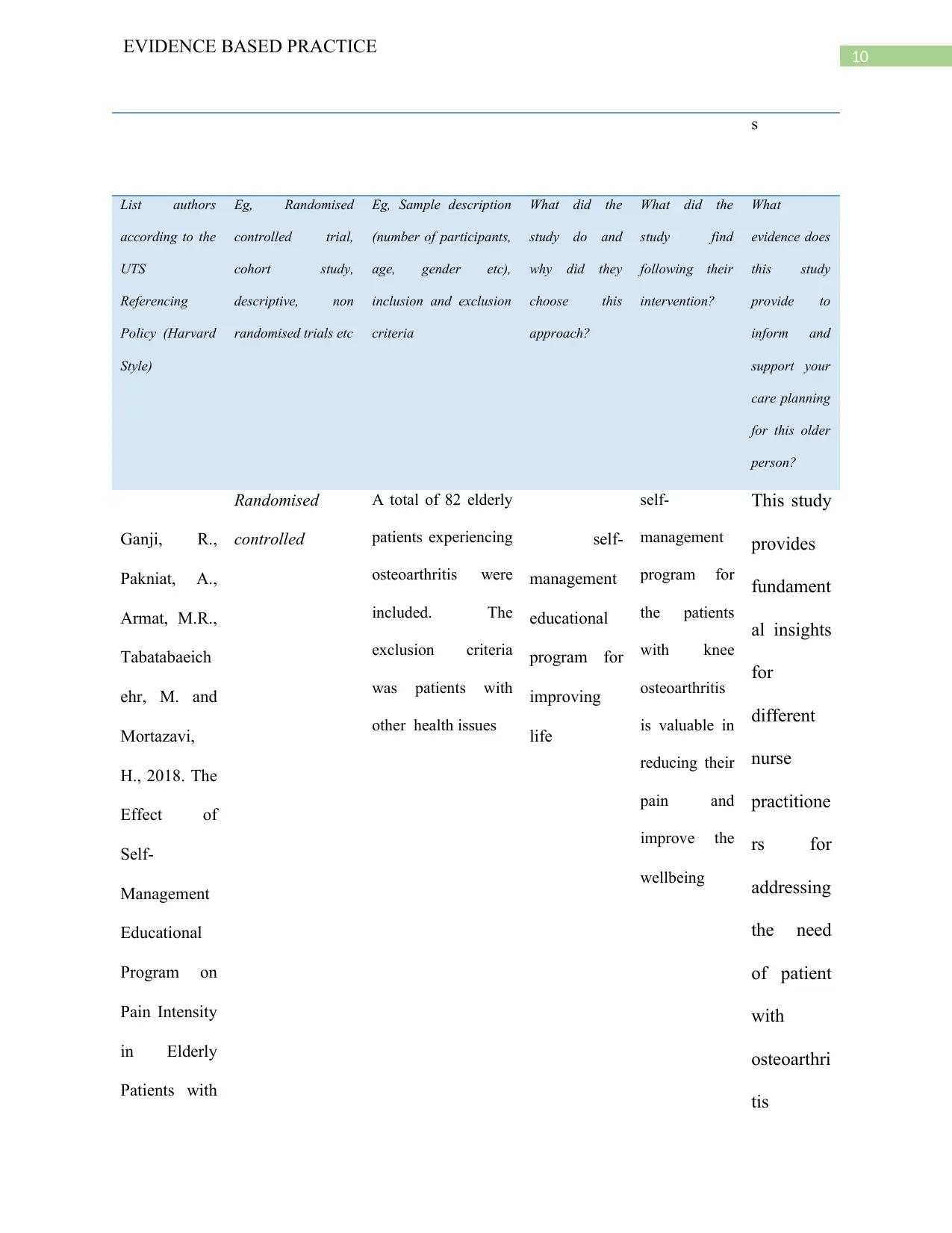
10
EVIDENCE BASED PRACTICE
s
List authors
according to the
UTS
Referencing
Policy (Harvard
Style)
Eg, Randomised
controlled trial,
cohort study,
descriptive, non
randomised trials etc
Eg, Sample description
(number of participants,
age, gender etc),
inclusion and exclusion
criteria
What did the
study do and
why did they
choose this
approach?
What did the
study find
following their
intervention?
What
evidence does
this study
provide to
inform and
support your
care planning
for this older
person?
Ganji, R.,
Pakniat, A.,
Armat, M.R.,
Tabatabaeich
ehr, M. and
Mortazavi,
H., 2018. The
Effect of
Self-
Management
Educational
Program on
Pain Intensity
in Elderly
Patients with
Randomised
controlled
A total of 82 elderly
patients experiencing
osteoarthritis were
included. The
exclusion criteria
was patients with
other health issues
self-
management
educational
program for
improving
life
self-
management
program for
the patients
with knee
osteoarthritis
is valuable in
reducing their
pain and
improve the
wellbeing
This study
provides
fundament
al insights
for
different
nurse
practitione
rs for
addressing
the need
of patient
with
osteoarthri
tis
EVIDENCE BASED PRACTICE
s
List authors
according to the
UTS
Referencing
Policy (Harvard
Style)
Eg, Randomised
controlled trial,
cohort study,
descriptive, non
randomised trials etc
Eg, Sample description
(number of participants,
age, gender etc),
inclusion and exclusion
criteria
What did the
study do and
why did they
choose this
approach?
What did the
study find
following their
intervention?
What
evidence does
this study
provide to
inform and
support your
care planning
for this older
person?
Ganji, R.,
Pakniat, A.,
Armat, M.R.,
Tabatabaeich
ehr, M. and
Mortazavi,
H., 2018. The
Effect of
Self-
Management
Educational
Program on
Pain Intensity
in Elderly
Patients with
Randomised
controlled
A total of 82 elderly
patients experiencing
osteoarthritis were
included. The
exclusion criteria
was patients with
other health issues
self-
management
educational
program for
improving
life
self-
management
program for
the patients
with knee
osteoarthritis
is valuable in
reducing their
pain and
improve the
wellbeing
This study
provides
fundament
al insights
for
different
nurse
practitione
rs for
addressing
the need
of patient
with
osteoarthri
tis
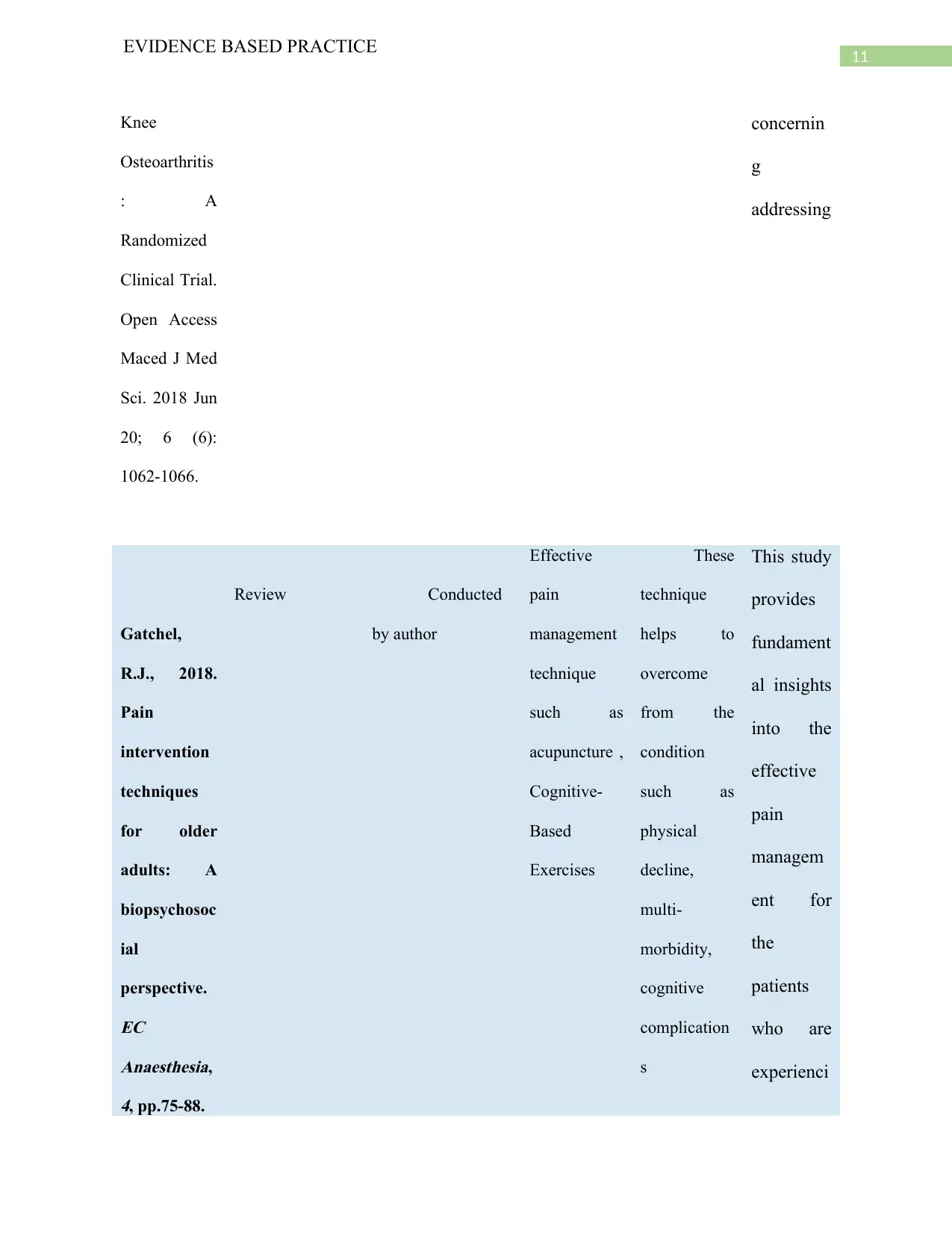
11
EVIDENCE BASED PRACTICE
Knee
Osteoarthritis
: A
Randomized
Clinical Trial.
Open Access
Maced J Med
Sci. 2018 Jun
20; 6 (6):
1062-1066.
concernin
g
addressing
Gatchel,
R.J., 2018.
Pain
intervention
techniques
for older
adults: A
biopsychosoc
ial
perspective.EC
Anaesthesia,4, pp.75-88.
Review Conducted
by author
Effective
pain
management
technique
such as
acupuncture ,
Cognitive-
Based
Exercises
These
technique
helps to
overcome
from the
condition
such as
physical
decline,
multi-
morbidity,
cognitive
complication
s
This study
provides
fundament
al insights
into the
effective
pain
managem
ent for
the
patients
who are
experienci
EVIDENCE BASED PRACTICE
Knee
Osteoarthritis
: A
Randomized
Clinical Trial.
Open Access
Maced J Med
Sci. 2018 Jun
20; 6 (6):
1062-1066.
concernin
g
addressing
Gatchel,
R.J., 2018.
Pain
intervention
techniques
for older
adults: A
biopsychosoc
ial
perspective.EC
Anaesthesia,4, pp.75-88.
Review Conducted
by author
Effective
pain
management
technique
such as
acupuncture ,
Cognitive-
Based
Exercises
These
technique
helps to
overcome
from the
condition
such as
physical
decline,
multi-
morbidity,
cognitive
complication
s
This study
provides
fundament
al insights
into the
effective
pain
managem
ent for
the
patients
who are
experienci
⊘ This is a preview!⊘
Do you want full access?
Subscribe today to unlock all pages.

Trusted by 1+ million students worldwide
1 out of 17
Related Documents
Your All-in-One AI-Powered Toolkit for Academic Success.
+13062052269
info@desklib.com
Available 24*7 on WhatsApp / Email
![[object Object]](/_next/static/media/star-bottom.7253800d.svg)
Unlock your academic potential
Copyright © 2020–2026 A2Z Services. All Rights Reserved. Developed and managed by ZUCOL.



